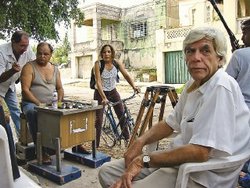The maker of lights, the cuban film maker Humberto Solas, died
- Submitted by: admin
- Arts and Culture
- Caribbean
- Cinema
- Destinations
- Havana
- history
- national
- personalities
- 09 / 20 / 2008

In some way I get calmed by the fact, even though he is no longer behind the camera or guiding with his enviable wisdom the coming editions of the International Cinema of Poor Cinema, he was president of since its foundation in 2003. His movies Lucía, Un hombre de éxito, Manuela, Amada, El siglo de las luces, Cecilia, Barrio Cuba will continue to speak themselves of the undeniable merits of the artist, of his sensibility, undeniable intelligence, while they will confirm again and again the great human deepest of the filmmaker.
Nobody would believe if at beginnings of this century somebody would have said that our island would have another world class international cinematographic event apart from the International Festival of New Latin American Cinema of Havana, much less if that person would said that the event would take place I the eastern city of Gibara, hundred of kilometres from the capital city. But time gave Solas the reason.
I close my eyes and I see him walking through the same streets of Villa Blanca de los Cangrejos, hurricane Ike tried to disappear during the last few days, unaware of what represents this beautiful city for the young filmmakers of the world and in the images of my mind sows up Solas, with his constant lighted cigarette «that is the cinema with his unchangeable vices», passionately talking without any rush with the sons of Gibara who, undoubtedly revere him. He dreamed in loud voice and always transmitted his enthusiasm.
It was in one of these intense days of the Festival that I heard he was born in Old Havana and when he was going to school, he loved to cross the Cathedral Square. «My world was the Cuban baroque, full of forms and volume with an unusual beauty», he told me. The same beauty he tried to leave forever in the celluloid, since, when together with another great, he decided «to establish the image of Cuba, the light of Cuba, the colours, the dialogue and the Cuban idiosyncrasy».
Then he confessed me, he also awake as a filmmaker thanks to the Italian neo-realism. «In a moment of my life, I wanted to do this cinema: simple movies, real ones, chronic of daily life and I shot Un día de noviembre, but the result was so traumatic that I decided to explode other topics, because the important thing for me was to make cinema; a privilege has been with me during all this years».
Before that, at the age of 14, Humberto Solas was part of the urban guerrilla of the 26 de Julio movement, an experience useful to «consolidate in me the nonconformist will, I am a man of Revolution, but without making any winks, without any indulgence, I’m critical with society and with the history of my country, according to my principles».
Therefore he gave us Miel para Oshún and Barrio Cuba, his last movie. «I just wanted to do a sincere movie, a testimony of the time we are living in, where the most important thing are the values it highlights: solidarity, family reunification, national unity. Barrio Cuba has been a liberating act. It is the most personal of my movies, with which I can finally do this kind of movie I have always been inclined to. More than that: it is the movie I would like to see in the cinema if any other director had made it instead of me».
But when Barrio Cuba was out, Solas was already a genius of the Cuban cinema, a master of the sense of Word; a filmmaker acclaimed by the world critic for having made in 1968 a classic as it is the movie Lucia, seen by the specialised critic as one of the ten most important Iberian American movies in history and among the ten anthologies of the Third World cinema. Un hombre de éxito (1985), on the other hand was the first Cuban movie to be nominated for an Oscar at the Best Foreign Movie.
Solas was the 2005 National Cinema award. He commented then that he tanked the recognition, if it was not an invitation to retirement. When he was asked what he wanted the public to remember about his movies, he answered: «My love for Cuba, for its culture, its appearance, for the curiosity of the Cubans for history, for that insatiable spirit of never being behind, of being always in the centre of the events, not distant of it.
«Let’s keep that condition of Cuba of being in central roles in memory. That condition of being at the level of the circumstances, of what is happening, of never being sleeping as has happened to some other countries for decades. There is much sleep around, but everything is under transformation nowadays. Lets see if we awake».
Humberto Solas leave us physically, but his great work stays, that work that will invite us always to go forward.
(Cubarte)
Comments